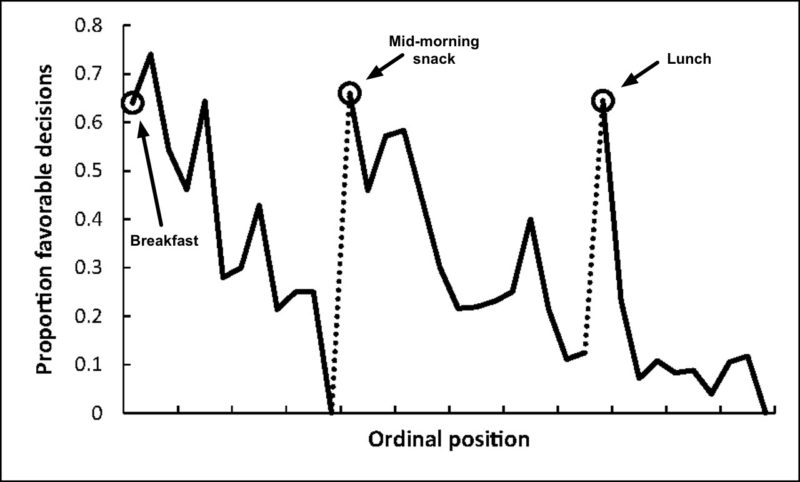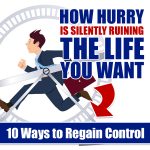 “I want to make the best, most
“I want to make the best, most
optimum decisions because better
decisions will lead to a better life.”
I applaud that desire. It is a core message of this website.
Unfortunately, optimum decision making in a given situation depends on a number of factors… all of which can derail your best intentions.
Fortunately, there is one small factor that can quickly and easily be leveraged to improve your decision making.
“Small hinges can swing big doors.”
If you take this factor into consideration in your daily decision making, you WILL see better outcomes. If you don’t, well… all your good intentions will not be enough to overcome the results.
What Research Discovered About When to Decide
In a research study published by the National Academy of Sciences, researchers wanted to look at the factors that influenced whether or not a judge approved a criminal for parole.
Over a 10 month period of time, they examined 1,112 judicial rulings. These rulings were to determine whether or not to allow the criminal to be released from prison on parole.
There were a number of factors you would expect that would influence the decision (the nature of the crime, how much time had already been spent in prison, how they had changed while there, etc.).
But, these were insignificant compared to the real influencer that should NOT have been a factor.
Time of day.
Notice two things on the chart below:
- The number of favorable rulings by the judges steadily declined as the day wore on (temporarily boosted by a recess, including a snack).
- The steep plunge in favorable rulings during the notorious afternoon period when people are typically most sluggish.
The Science Behind These Decision Making Results
What we have learned from additional physiological research is that our decision making abilities (like our willpower) are like a muscle. They have limited resources, which can get depleted and fatigued by 3 factors:
- The amount of the decisions we make
- How resource demanding are the decisions
- Our normal bodily cycles
The decisions you make slowly deplete your ability and willingness to make more decisions. Early on, your brain is willing to tackle tougher, more complex deliberations.
But after a while, due to mental and physical fatigue, the brain starts to default toward making easier, quicker decisions rather than continue to wrestle with tough decisions.
The greater the accumulated complexity or needed deliberation from earlier decisions, the faster the depletion.
Not only does the amount and type of decisions impact your mental resources (and blood glucose levels), so does the normal cycle of hunger and thirst. After all, your body isn’t a machine that can run endlessly.
That’s why at some point the judges switched to the easier decision: Deny. Deny. Deny.
It’s no different than a fatiguing workout, or a tiring run… at some point you want to coast.
These limited mental resources can be replenished to some degree but the sad reality is there are a limited number of bullets in your gun… until you wake up the next day. This is why working more hours often leads to a diminishing quality of work.
Before we go on, I’ve got to get something off my chest. One of the reasons I share these research and time-tested insights is because there are many unseen or overlooked/under-valued factors that influence your perceptions and choices.
Here’s my point: Yes, by all means pray about a decision. Yes, give it careful deliberation. But, don’t stop there. If you don’t take these verified influences into account, you WILL make inferior decisions.
There, I said it. I hope you will take it to heart.
If you are serious about dealing with these hidden factors, here’s an article that gives you 4 ways to experience greater freedom from these unseen influences on your decisions and perceptions.
3 Things You Can Do To Improve Your Decision Making (and Willpower)
Here is what you can start doing today to combat the effects of decision fatigue.
1. Manage your daily decision levels.
Since both the amount of decisions as well as the mental demand level impact your decision “stamina”, it is wise to control both (as much as you are able).
-
Allocate big, harder, more demanding decisions to your peak hours (As this research shows), usually early in the day. Leave the easier, less consequential decisions to your non prime-time periods.
-
Reduce the number of regular decisions you have to make in a day. Instead of regularly using up your limited mental resources on a number of less consequential daily decisions, decide them ahead of time, or even once and for all. For example, decide what you will eat and wear that day… the night before.
Better still, establish a habit for those things you consider important rather than wrestling with the same decision day after day (Should I go to the gym today? or, Should I go on a run before work?). If they are a habit, you don’t expend any mental energy deciding. You just do it.
2. Schedule times of restoration.
I know this one is a no-brainer, but we don’t always follow it. We often try to keep going, or “power through” to get more done… but you will actually get less done.
Fatigue makes cowards of us all. – Vince Lombardi
Fatigue makes fools of us all. It robs you of your skills and your judgment, and it blinds you to creative solutions. – Harvey Mackay
Start with the most important thing you can do: go to bed at a decent hour. Stop letting your TV, phone or computer dictate when you go to bed. You decide.. and stick to it. I think we would all agree that a good night’s rest helps us be at our best. Conversely, our decision making abilities are impaired when we are tired.
During the day, every 45-60 minutes, take a break from mental exertion. Go stretch, or walk a few stairs and get your blood flowing and replenish yourself with water and as needed, have a healthy snack. I also think it is helpful to consciously try to relax your body for a minute (usually by regulating your breathing).
I think of this “stepping away” process like a baseball player stepping out of the batter’s box temporarily… resetting and stepping back in to take his best swing.
3. Proactively prepare for decision fatigue situations
You know they are coming, so why not identify those times and situations (ahead of time) when you are usually depleted or impaired… and put counter measures into place?
For example, if you often find yourself in certain situations (e.g. shopping at the grocery store) on an empty stomach, and you are more susceptible to impulse buying, then eat before you go or eat a snack on the way.
For me, I found myself sticking to a diet during the day but in the evenings, after a glass of wine, I ate all sorts of yummy foods that I wouldn’t normally allow myself during the day. Don’t act like you don’t know what I’m talking about. So, before I had wine, I had to decide ahead of time what foods I would be allowed to have, how much… and stick to it. It might include putting a picture of an overweight person on the fridge to help remind me of the consequences.
Want a Better Life Tomorrow? Make Better Decisions Today
Take advantage of a ton of great (free!) decision making resources here.
Or better still, download my free decision making guide Proven 5 Step Process (Research Backed) to Making Better Decisions
“I am not a product of my circumstances. I am a product of my decisions.” —Stephen Covey
“We All Make Choices, But In The End Our Choices Make Us.” -Ken Levine
“Your life is determined by the sum of the choices that YOU make.” -Frank Sonnenberg










Please note: I reserve the right to delete comments that are offensive or off-topic.